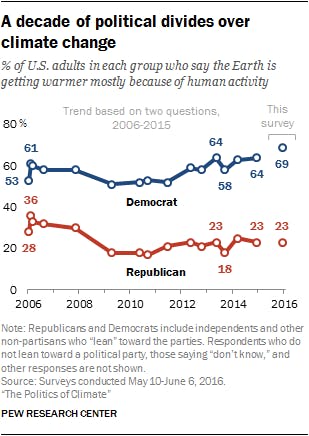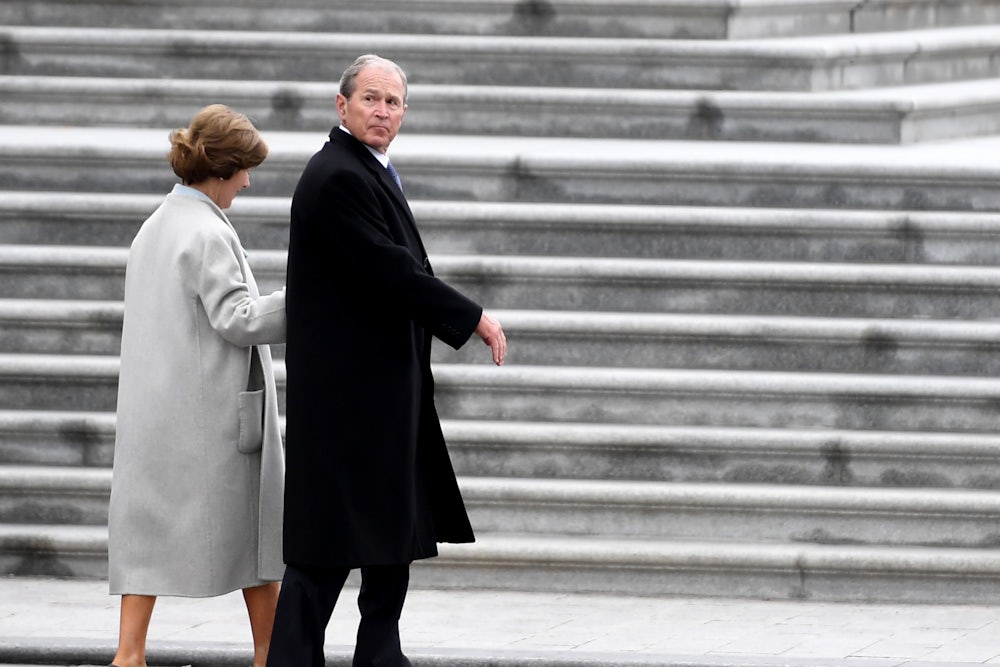Eleven years ago, President George W. Bush nominated a former energy industry attorney to oversee air pollution in America. Bill Wehrum was a controversial choice to lead the Environmental Protection Agency’s Office of Air and Radiation, for he had been paid for years by the chemical and utility industries that he would now be responsible for regulating. Resistance in the Republican-controlled Senate eventually forced Bush to withdraw the nomination, and Wehrum has been providing legal defense for fossil fuel companies ever since; he’s sued the EPA on behalf of industry interests 31 times since 2008.
This year, a new Republican president took interest in Wehrum—for the very same position. But the result was different. After a confirmation hearing where Wehrum feigned ignorance of basic climate science and ecology, the Republican-controlled Senate narrowly confirmed him on party lines. Wehrum was sworn in on Monday by EPA Administrator Scott Pruitt.
Why would Wehrum be confirmed in 2017, but not eleven years ago? It’s tempting to blame it on rising Republican extremism, but a closer look at Wehrum’s case reveals a different cause. Senate Republicans wanted to confirm him eleven years ago; even Lincoln Chafee, the moderate Republican who eventually ran for president as a Democrat, supported his nomination. They didn’t succeed simply because Democratic Senator Barbara Boxer, a notorious environmental champion, put a hold on Wehrum’s nomination—and a few months later, in the 2006 midterm elections, the Democrats took control of the Senate.
Anecdotally, the Republican Party under President Donald Trump does seem to have less regard for science and the environment than ever before. “The severity of the attacks on science are much greater now than they used to be,” said Michael Halpern, who joined the Union of Concerned Scientists (UCS) in 2004 to advocate for scientific integrity in the Bush administration. Climate deniers occupy, or have been tapped for, top positions across the federal government, including NASA and the Department of Energy; Trump even nominated a non-scientist talk show host to be the chief scientist of the USDA. “Bush at least tried to pretend his decisions were based on the best available science,” Halpern said. “Trump doesn’t even bother.”
Over the last ten months, the Trump administration has broken international promises to fight global warming, suppressed and distorted science to advance a deregulatory agenda, and replaced environmental advisers with fossil-fuel industry representatives. These moves may seem entirely unprecedented, but in reality, Bush drafted the blueprint for Trump’s house of denialism. Democrats nostalgic for a pre-Trump Republican Party should thus take note—because the similarities between the forty-third and forty-fifth presidents suggest that the GOP after Trump will be just as hostile to science and the environment, if not more so.
American presidents have long clashed with scientists whose findings conflicted with administration policies. Richard Nixon’s two science advisers quit after disagreements over the president’s cockamamie ideas. “[I]t’s not difficult to bamboozle a president, but it’s very difficult to de-bamboozle [a president], which I tried to do and it didn’t work,” Nixon adviser Edward David said in 2005. Nixon eventually got so frustrated that he disbanded the White House Office of Science and Technology Policy altogether. While acknowledging the scientific evidence that needle exchanges reduce HIV transmission, Bill Clinton nonetheless left intact a ban on federal funding for such programs; he and other Democrats feared appearing to support drug use.
Bush, a former oilman, was different. “At the time, he represented a new low in the relationship between the federal government and the scientific community,” said Halpern, now the deputy director of UCS’s Center for Science and Democracy. In 2004, UCS released a scathing report—endorsed by 20 Nobel laureates and signed by more than 12,000 scientists—charging that senior administration officials routinely tried to suppress or hide scientific information, either by silencing individual scientists, burying research, or censoring reports. A USDA microbiologist, for example, said “he was prohibited on no fewer than 11 occasions from publicizing his research” on the health impacts of airborne farm waste. Bush’s EPA was accused of withholding an important report on the costs and benefits of air pollution regulations. At one point, the Bush White House “blatantly tampered with the integrity of scientific analysis at a federal agency” by trying to get scientists to remove references to climate change from an EPA report.
These actions were unprecedented in 2004. Now, they’re commonplace. Like Bush, the Trump administration silences individual scientists: His EPA prevented climate scientists from presenting their research, and his Interior Department transferred a scientist who spoke out about climate change to the accounting department. The administration buries information: The EPA removed a page detailing the scientific explanation for climate change, and the latest FBI crime report is missing 70 percent of the data it used to have. And the administration scrubs language from reports—often the words “climate change.”
Bush was also accused of politicizing independent scientific review within the government. When choosing candidates for scientific advisory boards—committees that review the quality of science behind regulations—the Bush administration “repeatedly allowed political considerations to trump scientific qualifications,” according to the UCS report. When selecting members for a committee on childhood lead poisoning, for example, Bush administration officials explicitly rejected nominations from CDC staff. Instead, they appointed five new members who “were all distinguished by the likelihood that they would oppose tightening the federal lead poisoning standard.” Two of the new members had financial ties to the lead industry.
Similarly, Pruitt recently selected 17 new members for his agency’s 43-member Scientific Advisory Board, the body that reviews science behind EPA regulations. Several of Pruitt’s nominees either work directly for polluting industries or are financial beneficiaries of them; the new head of the clean air scientific committee, for example, runs a consulting firm for oil and chemical industry players. But there was another common thread: five of the new members doubt air pollution science, specifically the well-established notion that particulate matter can cause death. Pruitt also went a step further, reforming the rules of EPA advisory committees to disqualify expert scientists from serving.
And while Trump has appointed a record number of climate deniers to key positions, his administration is not the first to hire conflicted, anti-science advisors. Bush’s choice for chief White House environmental advisor, James Connaughton, was a lobbyist for industrial polluters like mining, chemical, and utility companies. Kathleen Hartnett White, Trump’s nominee for that same position, is a climate-change denier who has defended coal and oil as the “lifeblood of the modern world.”
A few months after taking office in 2001, Bush announced that he wouldn’t implement the Kyoto Protocol on global warming, a decision he justified by claiming more research was needed to prove the severity of the problem. “We will act, learn and act again, adjusting our approaches as science advances and technology evolves,” he said. In reality, according to UCS, Bush officials “consistently sought to undermine the public’s understanding of the view held by the vast majority of climate scientists that human-caused emissions of carbon dioxide and other heat-trapping gases are making a discernible contribution to global warming.”
A few months into his own presidency, Trump also announced plans to abandon an international climate agreement. He declared in June that the U.S. would withdraw from the Paris climate accord because of what he called “the draconian financial and economic burdens the agreement imposes on our country.” But unlike Bush, Trump didn’t even pretend to pay attention to the science of climate change.

Which brings us to several key differences between them. Bush never appointed an EPA administrator who built his career by repeatedly suing the EPA, as Pruitt has. Bush’s first administrator, Christine Todd Whitman, was politically moderate and pro-science; there was never the fear that she would methodically dismantle the entire agency. And most important, Bush evolved on the issue of climate change. While he started his term denying reports from his own science advisers on the reality of human-caused warming, he began to acknowledge human activity’s role in 2005, when he said, “It’s now recognized that the surface of the earth is warmer, and that an increase in greenhouse gases caused by humans is contributing to the problem.” Despite the change in Bush’s public stance, though, he never actually implemented policies to address global warming. In fact, he actively fought climate policies all the way to the Supreme Court.
But Trump will never moderate like Bush did, however superficially, because he doesn’t have to. Bush’s evolution on climate change was consistent with a broader trend within the Republican Party—a trend that reversed in the Obama years. There used to be political consequences for attacking environmental policies that protect human health, but that’s likely not true anymore. The tribalism of the Republican Party has become too extreme. Among their core voters, GOP politicians will pay a greater penalty for accepting the science of climate change rather than rejecting it. Bush isn’t wholly responsible for that sad reality, but he led the retreat from empiricism that brought us here.
